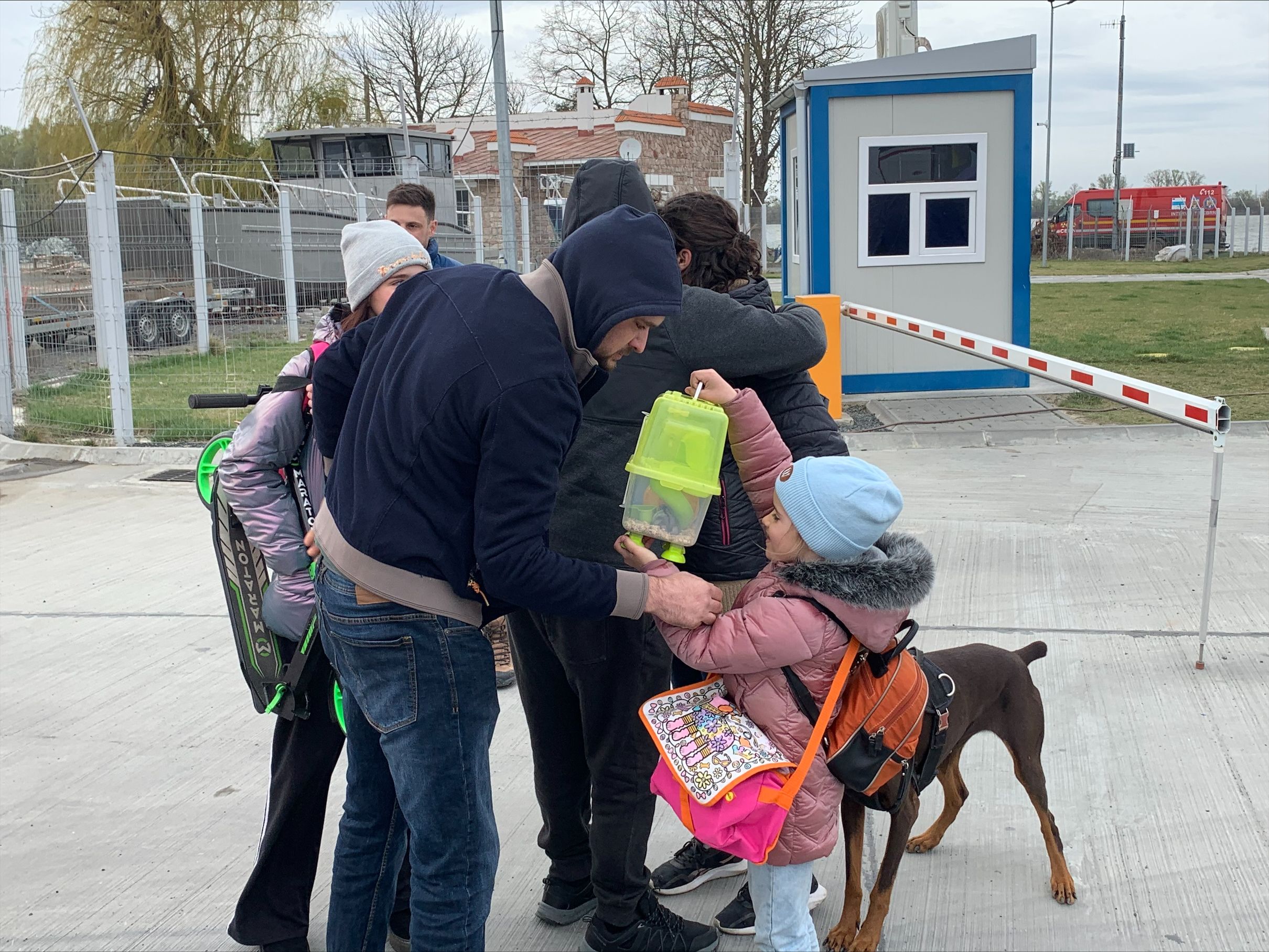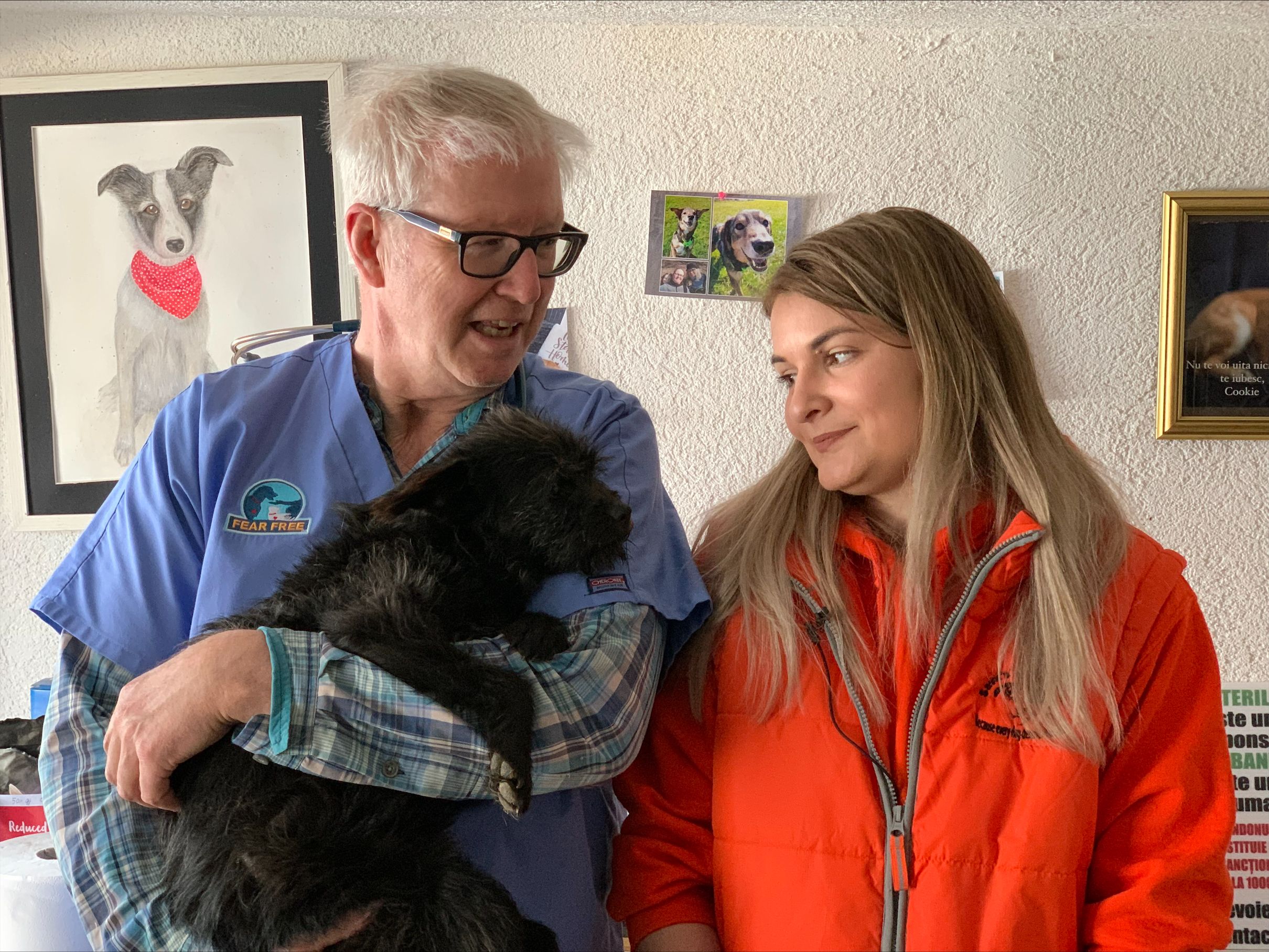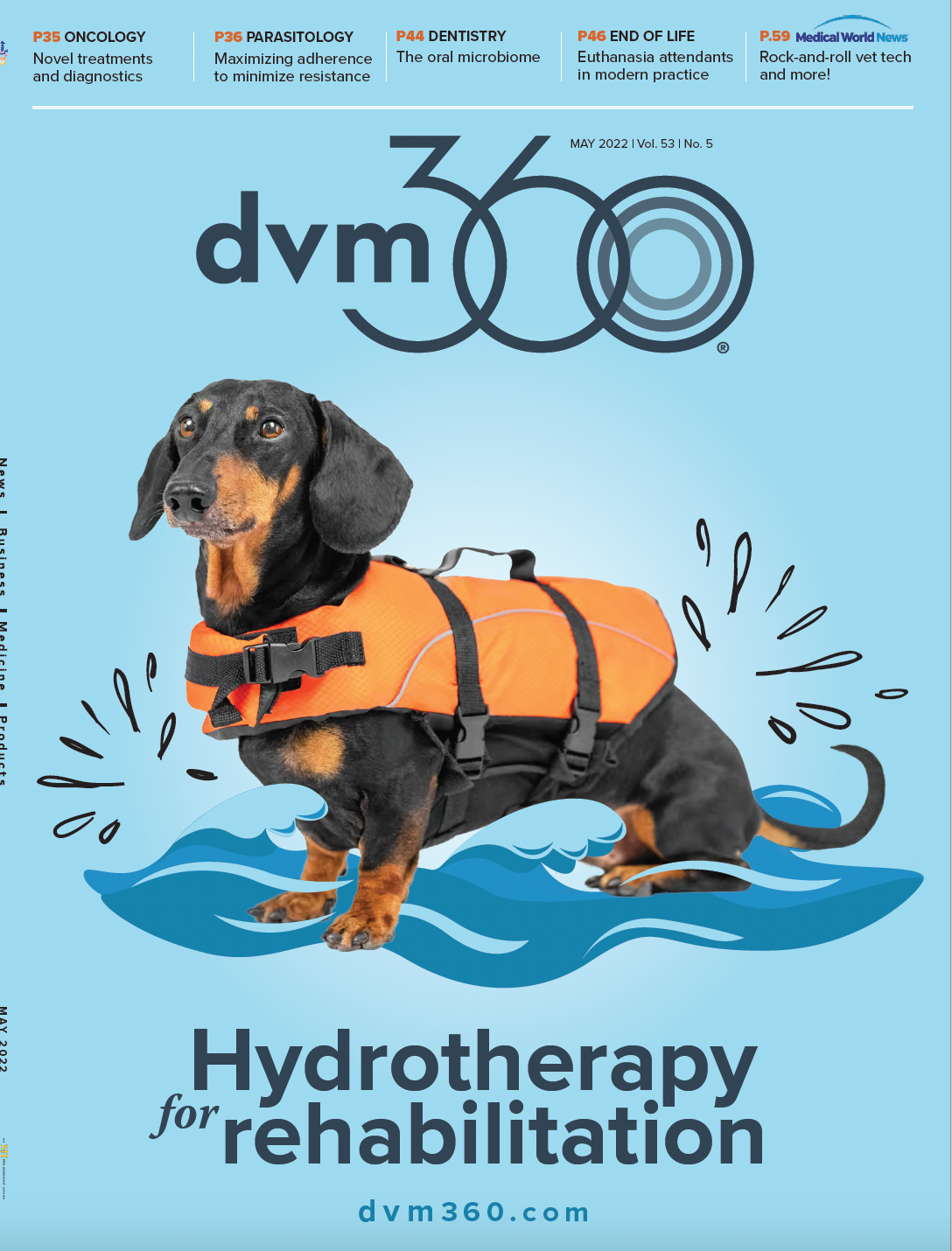Veterinarian travels to Ukraine border to help provide animal care
As a volunteer with World Vets, Marty Becker, DVM, worked with local organizations in Romania and Moldova to assess the unmet needs of pets affected by war, and help facilitate free veterinary services to care for them.
Credit: World Vets
After crossing the border into Romania, a young girl showed her hamster in a cage. She called the pet her "best friend" and had traveled with it from neighboring Ukraine.

A mother and her 2 young daughters—refugees from war-torn Ukraine—arrived at a shelter in Romania, each with a pet: a muzzled dog, a cat carried in a backpack, and a hamster in a small cage. Marty Becker, DVM, a volunteer with the nonprofit, international veterinary aid organization World Vets, watched as the trio reunited with the girls’ father, from whom they had been separated for about a month. Along with the humans’ excitement, the dog greeted the man by jumping up on its hind legs and furiously licking him.
“He was happy to see the dog. The dog was happy to see him,” said Becker.
One of the girls had told Becker the hamster was her “best friend.” Upon seeing her father, she held the cage up to proudly show her pet as the man knelt to look.
“That human animal bond, to her, I think, was a lifeline,” Becker said in an interview with dvm360®.
Many people are leaving Ukraine as refugees, seeking safety from the violence that has come with Russia’s ongoing invasion. The humanitarian crisis has also displaced countless pets, according to World Vets. Many of these animals need food, shelter, and veterinary care for their survival.1
Volunteers like Becker, founder of Fear Free and a dvm360® advisory board member, and his World Vets peers are helping displaced dogs, cats and other pets at Ukraine borders. Becker recently traveled to Romania and Moldova—the 91st country he has visited—to help assess unmet needs and facilitate free veterinary services for animals arriving from Ukraine.
“Moldova, Romania, and Ukraine come together in this one spot, right by the Danube River,” said Becker.
According to World Vets, Becker’s mission was to coordinate efforts with the organization’s existing partners in Romania and Moldova.1 Cathy King, DVM, PhD, World Vets founder and CEO, said Becker spent time in clinic and on the border’s front lines. “His first hand accounts helped to guide our strategy for prioritizing aid in the region. He has also done a tremendous amount to bring awareness to the situation and to direct funding to local groups aiding refugees and their pets, especially in Romania,” said King, in an email to dvm360®.
Becker also met with the head of Romania’s veterinary medical association to discuss what local veterinarians were seeing and where help was needed. “The 1 thing you don’t have to worry about is the animals in need finding love and attention,” said Becker. “I met people over there who walked 20 miles carrying a dog to safety.”
WORKING WITH LOCAL RELIEF ORGANIZATIONS
Sava’s Safe Haven in Galati, Romania is one partner Becker worked with during his trip. The family-run, nonprofit shelter is dedicated to caring for homeless and stray animals in the region’s poor, rural areas.2 World Vets knew it had a capable, dedicated partner through an established working relationship with Sava’s Safe Haven, and is providing free veterinary services to pets of Ukranian refugees as well as veterinary supplies at the shelter, noted King.
“We are helping to financially support their aid station that is located at the entry point where refugees are crossing the Ukraine border into Romania with their pets. It is anticipated that the need for veterinary services will continue long term in the region and, therefore, we are also making longer term plans to recruit a veterinary team in the coming months to go there to provide additional medical, surgical, and preventive health campaigns for pets of refugees as well as abandoned pets that are brought to the shelter,” said King.
Credit: World Vets
Marty Becker, DVM, (left) with Alexandra Sava of Sava's Safe Haven, a nonprofit shelter near Galati, Romania, and Phyllis, a dog being adopted by Becker.

Sava’s Safe Haven is also working to find new homes for displaced pets in need, and sending food and other supplies across the border to Ukraine. According to social media statements made by the organization, these critical supplies are being shared with people who chose to remain in Ukraine, many of whom are elderly and include individuals who are feeding street animals.
In a social media post, Becker said he witnessed Sava’s Safe Haven sending 2.5 tons of dog food to a ferry crossing between Romania and Ukraine to feed pets that are owned and living in shelters— even though the organization was starting to run short on dog food. A similar run is made “at least every other day,” he wrote on Facebook.
At a partner clinic in Chișinău, Moldova, World Vets previously funded the costs of veterinary services for pet owners who were strugging during the COVID-19 pandemic, according to King. “We are now offering free veterinary services for any pets from Ukraine at that same clinic,” she said.
PEOPLE AND PETS STAY CONNECTED
Becker, a World Vets advisory board member, said one the biggest takeaways from his experience near Ukraine are the strength of the human-animal bond and the resilience of people and pets. “If you’re tested, you’ll really see what you can do,” he said.
He recalled a Ukrainian woman who had lost her husband and her home because of the war. She arrived at the border aid station in Moldova with a young girl and a dog that had been injured. Although the dog had been limping, it began running after smelling the shelter. “It’s got a fight or flight response,” Becker said.
Grieving the death of her husband, the woman said the dog would now be her constant companion, according to Becker. “Beyond that affection connection, and the healing power of pets, I don’t know what else she would do. There’s nothing [for her] to go back to. Her house is gone,” said Becker.
Another woman, he said, crossed a border from Ukraine with 10 leashed dogs. She had walked in freezing temperatures, pulling a wagon with food and supplies to care for her pets but nothing for herself.
CONCLUSION
Becker noticed during his trip that veterinary technology in the region he visited is generally lacking compared with modern US facilities, although not as primitive as he’s seen in other countries. One clinic in Moldova had a single radiology machine, for example. Becker said the staff was using oven mitts rather than the safer, lead-lined gloves US veterinary professionals typically use to operate it.
Overall, he said, there is need for more modern veterinary technology and equipment as well as food and basic supplies to care for displaced pets. He brought with him to the Ukraine border region 3 large suitcases filled with toys for the animals he would be serving.
“There are things we can do to help,” said Becker.
According to World Vets, many in the organization’s community want to help the pets and people of Ukraine. To that end, World Vets is requesting financial contributions in support of its efforts to assist in the veterinary care of Ukrainian pets. Donors may visit worldvets.org to direct a monetary gift to World Vets’ international disaster response fund for helping pets from Ukraine.1
REFERENCES
- World Vets. Helping pets from Ukraine. Worldvets.org. March 30, 2022. Accessed April 27, 2022. https://worldvets.org/campaigns/news/
- Sava’s Safe Haven. A family-run shelter in Galati, Romania. Savasafehaven.com. 2022. Accessed April 27, 2022. https://savasafehaven.com/

Veterinary Heroes: Patricia Kennedy Arrington, DVM, CVFP
December 1st 2024As a leader in 24-hour veterinary care and a champion for women in the field, Patricia Kennedy Arrington, DVM, CVFP, has dedicated her 50-year career to transforming veterinary medicine and inspiring future practitioners.
Read More
Veterinary Heroes: Valerie J. Parker, DVM, DACVIM (SAIM, Nutrition)
November 30th 2024Guiding the next generation of veterinary professionals and improving patients’ health through nutrition is the driving force for 2024 Veterinary Hero in nutrition, Valerie J. Parker, DVM, DACVIM (SAIM, Nutrition)
Read More